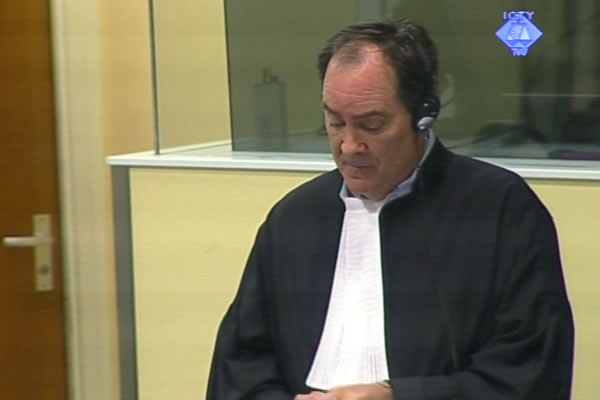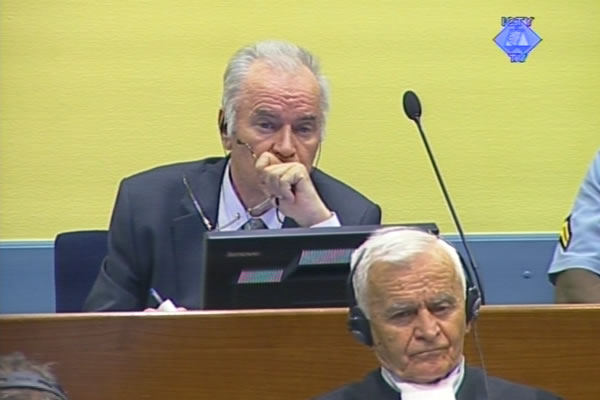Home
MLADIC – MASTER OF LIFE AND DEATH
In the second part of the opening statement at the trial of former VRS Main Staff commander Ratko Mladic, the prosecution set the stage for the evidence of Mladic’s individual criminal responsibility for the genocide in Srebrenica. After the opening statement, the trial was adjourned ‘until further notice’. It remains uncertain when the prosecution will start presenting its evidence
 Peter McCloskey, prosecutor at the Ratko Mladic trial
Peter McCloskey, prosecutor at the Ratko Mladic trial The prosecution continued the opening statement at the trial of Ratko Mladic, focusing on one of four joint criminal enterprises and one of two genocide charges listed in the indictment: murder of more than 7,000 men and boys and the deportation of more than 30,000 women, children and elderly from Srebrenica and Zepa in July 1995. The evidence of those crimes has already been presented at previous Srebrenica trials. Prosecutor Peter McCloskey indicated the prosecution’s case would not focus on crimes but on ‘individual criminal responsibility of Ratko Mladic’.
As the prosecutor argued, there was ‘overwhelming evidence’ about the events in Srebrenica, such as the remains of 5,977 persons exhumed from mass graves. Most of them have been identified using DNA analysis. There are also testimonies of 11 ‘miraculous men’ who managed somehow to survive the executions and ‘escape the bloodshed’. There were also aerial photos of mass graves, VRS documents about the effort to dig up and transfer the bodies to secondary graves, the evidence of Serb soldiers involved in the executions, intercepted conversations of VRS officers discussing the mass executions and two videos of actual executions in Kravica and Trnovo.
In a bid to highlight Mladic’s responsibility, the prosecutor said the crimes in Srebrenica were committed by an army ‘strictly under the control from the top’: the accused who was its commander throughout entire war in BH. The crimes were carried out with ‘incredible discipline, organization and military efficiency’. VRS soldiers carried out the orders, ‘capturing, detaining, transporting, murdering and burying’ over 7,000 men and boys in just four days, from 12 to 16 July 1995. The fact that such a crime was committed in full secrecy was a ‘truly amazing feat of utter brutality’, prosecutor McCloskey emphasized.
According to the prosecution’s evidence, Ratko Mladic exercised full control over his troops at the time of the Srebrenica operation. Mladic issued orders and received regular reports about the developments in the field. Mladic was present in the Srebrenica and Bratunac area between 11 and 14 July 1995. Mladic then went to Belgrade and stayed there for two days, but again received reports about the crimes on at least one occasion. British general Rupert Smith warned Mladic at a meeting in Belgrade on 15 July 1995 that there were ‘rumors of atrocities, massacres and rape’ in Srebrenica. Instead of investigating the allegations, Mladic attended a wedding with his wife, as shown by photos in possession of the prosecution.
Many video recordings in the prosecution’s possession testify to Mladic’s involvement in the genocide in Srebrenica. Some of them were shown in court today, including the recording made on 25 July 1995, showing Mladic promising safe passage out of Zepa to the Muslims leaving the town; among them were some men of military age. ‘I am giving you the gift of life’, Mladic told them. According to the prosecution, this indicates that Mladic considered himself as a man who ‘can take or give life’. At that time, Mladic knew that the news of the mass executions in Srebrenica had spread, and was trying to portray himself in the best possible light, by ‘giving the gift of life’. The prosecution will try to prove that more than 7,000 Muslims from Srebrenica weren’t as lucky and that Mladic was responsible for their deaths.
Concluding the prosecution’s opening statement, lead attorney Dermot Groome gave an indication of the prosecution’s closing argument. After the trial has ended, he will urge the judges to ‘give to the Bosnian people what they have been waiting for such a long time: truth about what Ratko Mladic did to that wonderful and complex country’.
The Trial Chamber decided that the prosecution could not start presenting its evidence on 29 May 2012 as previously scheduled, because it has failed to turn over to Ratko Mladic all the materials necessary for the preparation of his defense. The presiding judge Alphons Orie said the trial was adjourned ‘until further notice’.
Photos
Linked Reports
- Case : Mladic
- 2012-05-16 PROSECUTION: ‘GENERAL MLADIC HAD A HAND IN CRIMES’
- 2012-05-15 MLADIC’S MOTION TO DISQUALIFY JUDGE ORIE DENIED
- 2012-05-14 MLADIC AGAIN ASKS THE JUDGES TO ADJOURN HIS TRIAL FOR SIX MONTHS
- 2012-05-21 PROSECUTION’S ‘TECHNICAL ERROR’ IN MLADIC CASE
- 2012-05-24 RATKO MLADIC’S TRIAL CONTINUES ON 25 JUNE 2012
- 2012-05-31 MLADIC’S NEW MOTION TO ADJOURN TRIAL

